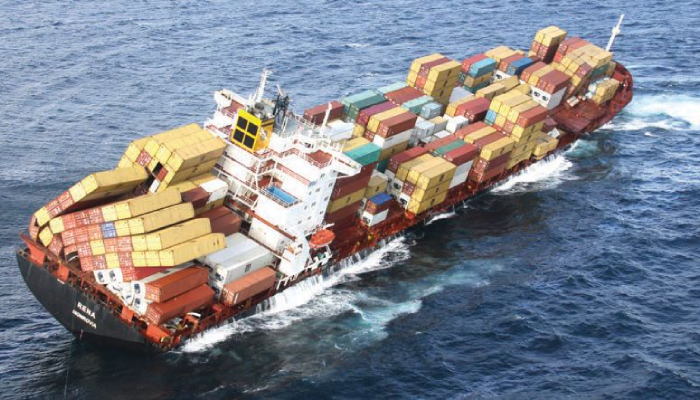
or

Vessels earn when they sail and burn cash when they stand but become tragedy when they meet with accident or collision. Collisions between the ships lead to unavoidable claims, and eventually to litigation. In maximum reported collision cases, the cause of action pleaded by the party is negligence or breach of a duty of care. In English law that is defined as the breach of a recognized duty of care owed to a person who may be reasonably be foreseen to suffer loss as a direct result of that breach. The Indian law of tort also has the same defining elements to establish the negligence in the case.
The amount of damages incurred due to the collision are just beyond the imagination as it includes various costs and expenses which are not limited to the damage to the colliding vessel or ships like salvage etc.
The reasons behind the collisions are numerous as not only one factor contributes to the accident but many. Hence, the damages and consequential losses. For e.g. due to the increase in the traffic on the high seas and poor navigation etc.
Many collision cases are resolved by the settlement between the parties or more frequently, between their insurers, since the financial consequences of collision are invariably covered in large measure by the insurances on the ships involved.
During the collision litigation, it is very important to understand the involvement of insurance interests concerned. There are various types of insurance covered for e.g.
Loss of earnings due to detention for collision damage repairs
Apart from the aforesaid developments, in order to establish the case or the claim, the lawyer has to collect many more records and evidences as summarized below;
Survey report of damages suffered by the client ship and the opponent ship as a result of the collision
Security- letter of guarantee issued by the P & I Club of the ship concerned to guarantee payment of whatever damages are due and payable at the conclusion of the litigation.
Investigation of a collision- written statement of the officers and crew members are taken on record. Under English law such statement is privileged. It is very cost and time effective as such statements are treated as evidence in the court except where the witness is called to give oral evidence.
Independent evidence- evidence like a videotape recording of the radar showing movements of the ships concerned made by an expert and it has a high value in a collision case. Therefore, the lawyer has to make it sure that it is preserved safely.
Choice of jurisdiction- upon deciding the jurisdiction of the court for the litigation, the recovering and paying party has to be vigilant like which court of law is likely to pay or assist in recovering the claim. There are various conventions also which has the rules for establishing of jurisdiction in collision case in case when the agreement is not clear about the jurisdiction.
The principles of liability for collision are included in the Part X-A of the Indian Merchant Shipping Act 1958 and in the international convention on limitation of liability for Maritime Claims 1976 as well. The basic principles in the act or in convention says that the owner of a ship involved in a collision is liable to make the good damage suffered as a result of the collision in proportion to that ship’s fault.
The safety rules for avoidance of collisions at sea are included in the part IX & X of The Indian Merchant Shipping Act, 1958 and also in the various international conventions like 1972 IMO COLREGs CONVENTION. At the time of assessment of collision claim, the breach of such conducts are considered to know who’s at fault or to be blamed for the negligence or breach of the duty to care.
To establish a collision case as meritorious case, the lawyer has to be multi-tasking in collecting various information or record to present them in the court with promptness and diligence. Therefore, a good choice of lawyer to handle a collision case is very important for an interested party. The collision case depends mainly on choice of jurisdiction for litigation and terms for any proposed settlement to resolve it in less time and be cost efficient
Pradeep K Jain is the Managing Partner at Singhania & Co., Mumbai Office, and an expert in Maritime and Corporate Law.
Nalini Mishra - Senior Associate

Lex Witness Bureau

Lex Witness Bureau

For over 10 years, since its inception in 2009 as a monthly, Lex Witness has become India’s most credible platform for the legal luminaries to opine, comment and share their views. more...
Connect Us:


The Grand Masters - A Corporate Counsel Legal Best Practices Summit Series
www.grandmasters.in | 8 Years & Counting
The Real Estate & Construction Legal Summit
www.rcls.in | 8 Years & Counting
The Information Technology Legal Summit
www.itlegalsummit.com | 8 Years & Counting
The Banking & Finance Legal Summit
www.bfls.in | 8 Years & Counting
The Media, Advertising and Entertainment Legal Summit
www.maels.in | 8 Years & Counting
The Pharma Legal & Compliance Summit
www.plcs.co.in | 8 Years & Counting
We at Lex Witness strategically assist firms in reaching out to the relevant audience sets through various knowledge sharing initiatives. Here are some more info decks for you to know us better.
Copyright © 2020 Lex Witness - India's 1st Magazine on Legal & Corporate Affairs Rights of Admission Reserved